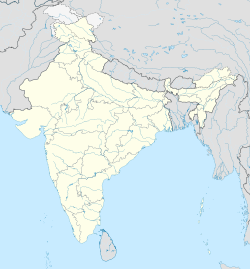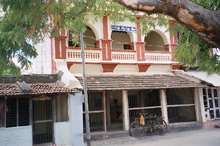Ettayapuram
| Ettayapuram எட்டயபுரம் |
||
|---|---|---|
|
|
||
| State : |
|
|
| State : | Tamil Nadu | |
| District : | Thoothukudi | |
| Sub-district : | Ettayapuram | |
| Location : | 9 ° 9 ′ N , 78 ° 0 ′ E | |
| Residents : | 12,772 (2011) | |
Ettayapuram or Ettaiyapuram ( Tamil : எட்டயபுரம் Eṭṭayapuram [ ˈjɘʈːəjəpuɾʌm ]) is a city in the Indian state of Tamil Nadu . The population is around 13,000 (2011 census).
Ettayapuram is located about 100 kilometers south of Madurai and 50 kilometers north of Thoothukudi in the Thoothukudi district in southern Tamil Nadu. The distance to Chennai , the capital of the state, is around 550 kilometers. Ettayapuram is the capital of the talk Ettayapuram .
Ettayapuram was founded in 1576 by a dynasty of feudal lords who originally came from Chrandragiri in what is now the state of Andhra Pradesh . At the beginning of the 14th century, they should have fled from Malik Kafur's campaigns to conquer Madurai and become vassals of the Pandya kings there. After the area of Ettayapuram came under British rule in 1801 , the British established the Rajas of Ettayapuram as zamindars (landowners). In 1901 the Rajas of Ettayapuram owned an area of 1476 square kilometers with 422 villages and 154,000 inhabitants (1901). During the 19th century, the Rajas of Ettayapuram continued their feudal lifestyle and distinguished themselves among other things as promoters of Tamil literature.
The poet Subramaniya Bharati (1882–1921), who is considered the founder of modern Tamil poetry, was born in Ettayapuram. At a young age he briefly served as court poet of the Rajas of Ettayapuram, but soon turned his back on the court. Bharati's birthplace in Ettayapuram is now a museum.
95 percent of Ettayapuram's residents are Hindus , 3 percent Muslim and 2 percent Christian . The main language is Tamil , which is spoken by almost 100 percent of the population as their mother tongue.
Individual evidence
- ^ Census of India 2011.
- ^ Imperial Gazetteer of India, Vol. 12: Einme to Gwalior, Oxford: Clarendon Press, 1908, keyword "Ettaiyāpuram Estate" (p. 48) .
- ^ Sascha Ebeling: Colonizing the Realm of Words. The Transformation of Tamil Literary Culture in Nineteenth-Century South India, Albany: State University of New York Press, 2010, p. 130.
- ^ Census of India 2011: C-1 Population By Religious Community. Tamil Nadu.
- ↑ Census of India 2001: C-16 City: Population by Mother Tongue (Tamil Nadu), accessed under Tabulations Plan of Census Year - 2001 .

